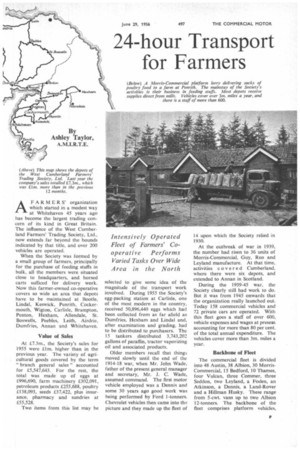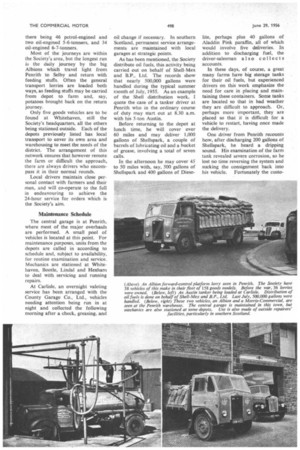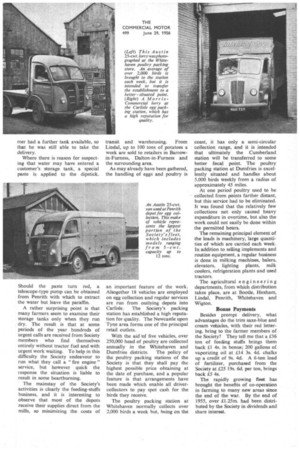24-hour Transport for Farmers
Page 69

Page 70

Page 71

If you've noticed an error in this article please click here to report it so we can fix it.
AFARMER S' organization which started in a modest way at Whitehaven 45 years ago has become the largest trading concern of its kind in Great Britain. The influence of the West Cumberland Farmers' Trading Society, Ltd., now extends far beyond the bounds indicated by that title, and over 200 vehicles are operated.
When the Society was formed by a small group of farmers, principally for the purchase of feeding stuffs in bulk, all the members were situated close to headquarters, and horsed carts sufficed for delivery work. Now this farmer-owned co-operative covers so wide an area that depots have to be maintained at Bootle, Linda!, Keswick, Penrith, Cockermouth, Wigton, Carlisle, Brampton. Penton, Hexham, Allendale, St. Boswells, Peebles, Leith, Airdrie, Dumfries, Annan and Whitehaven.
Value of Sales At £7.3m., the Society's sales for 1955 were £1m. higher than in the previous year. The variety of agricultural goods covered by the term " branch general sales" accounted for £5,547,643. For the rest, the total was made up of eggs at £996,690, farm machinery £302,091, petroleum products £255,688, poultry £138,093, seeds £37,422, plus insurance, pharmacy and sundries at £55,528.
Two items from this list may be
selected to give some idea of the magnitude of the transport work involved. During 1955 the Society's egg-packing station at Carlisle, one of the most modern in the country, received 50,896,440 eggs which had been collected from as far afield as Dumfries, Hexham and Lindal and, after examination and grading, had to be distributed to purchasers. The 15 tankers distributed 3,743,202 gallons of paraffin, tractor vaporizing oil and associated products.
Older members recall that things moved slowly until the end of the 1914-18 war, when Mr. John Wade, father of the present general manager arid secretary, Mr, 1. C. Wade, assumed command. The first motor vehicle employed was a Dennis and some 30 years ago good work was being performed by Ford 1-tonners. Chevrolet vehicles then came into the picture and they made up the fleet of
14 upon which the Society relied in 1930.
At the outbreak of war in 1939, the number had risen to 36 units of Morris-Commercial, Guy, Reo and Leyland manufacture. At that time, activities covered Cumberland, where there were six depots, and extended to Annan in Scotland.
During the 1939-45 war, the Society clearly still had work to do. But it was from 1945 onwards that the organization really launched out. Today 158 commercial vehicles and 72 private cars are operated. With this fleet goes a staff of over 600, vehicle expenses and wages at preseat accounting for more than 80 per cent. of the total annual expenditure. The vehicles cover more than 3m. miles a year.
Backbone of Fleet The commercial fleet is divided into 48 Austin, 38 Albion, 30 MorrisCommercial, 15 Bedford, 10 Thames, four Vulcan, three Commer, three Seddon, two Leyland, a Foden, an Atkinson, a Dennis, a Land-Rover and a Hillman Husky. These range from 5-cwt. vans up to two Albion 12-tonners. The backbone of the fleet comprises platform vehicles, there being 46 petrol-engined and two oil-engined 5-6-tonners, and 34 oil-engined 6-7-tonners.
Most of the journeys are within the Society's area, but the longest run is the daily journey by the big Albions which travel light from Penrith to Selby and return with feeding stuffs. Often the general transport lorries are loaded both ways, as feeding stuffs may be carried from depot to farm and, say, potatoes brought back on the return journey.
Only five goods vehicles are to be found at Whitehaven, still the Society's headquarters, all the others being stationed outside. Each of the depots previously listed has local transport to cover its own area and warehousing to meet the needs of the district. The arrangement of this network ensures that however remote the farm or difficult the approach, there are always drivers who encompass it in their normal rounds.
Local drivers maintain close personal contact with farmers and their men, and will co-operate to the full in endeavouring to achieve the 24-hour service for orders which is the Society's aim.
Maintenance Schedule The central garage is at Penrith. where most of the major overhauls are performed. A small pool of vehicles is located at this point. For maintenance purposes, units from the depots are called in according to schedule and, subject to availability, for routine examination and service. Mechanics are stationed at Whitehaven, Bootle, Lindal and Hexhani to deal with servicing and running repairs.
At Carlisle, an overnight valet ing service has been arranged with the County Garage Co., Ltd., vehicles needing attention being run in at night and collected the following morning after a check, greasing, and oil change if necessary. In southern Scotland, permanent service arrangements are maintained with local garages at strategic points.
As has been mentioned, the Society distribute oil fuels, this activity being carried out on behalf of Shell-Mex and BR, Ltd. The records show that nearly 500,000 gallons were handled during the typical summer month of July, 1955. As an example of the Shell distribution work. I quote the case of a tanker driver at Penrith who in the ordinary course of duty may start out at 8.30 a.m. with his 5-ton Austin.
Before returning to the depot at lunch time, he will cover over 60 miles and may deliver 1,000 gallons of Shellspark, a couple of barrels of lubricating oil and a bucket of grease, involving a total of seven calls.
In the afternoon he may cover 45 to 50 miles with, say, 500 gallons of Shel'spark and 400 gallons of Dieso lite, perhaps plus 40 gallons of Aladdin Pink paraffin, all of which would involve five deliveries. In addition to discharging fuel, the driver-salesman also collects accounts.
In these days, of course, a great many far ins have big storage tanks for their oil fuels, but experienced drivers on this work emphasize the need for care in placing and maintaining these containers. Some tanks are located so that in bad weather they are difficult to approach. Or, perhaps more important, they •are placed so that it is difficult for a vehicle to restart, having once made the delivery.
One driver from Penrith recounts how, after discharging 200 gallons of Shellspark, he heard a dripping sound. His examination of the farm tank revealed severe corrosion, so he lost no time reversing the system and sucking the consignment back into his vehicle. Fortunately the custo mer had a further tank available, so that he was still able to take the delivery.
Where there is reason for suspecting that water may have entered a customer's storage tank, a special paste is applied to the dipstick.
Should the paste turn red, a telescope-type pump can be obtained from Penrith with which to extract the water but leave the paraffin.
A rather surprising point is that many farmers seem to examine their storage tanks only when they run dry. The result is that at some periods of the year hundreds of urgent calls are received from Society members who find themselves entirely without tractor fuel and with urgent work waiting. To help in this difficulty the Society endeavour to run what they call a 'fire engine" service, but however quick the response the situation is liable to result in some heartburning.
The mainstay of the Society's activities is clearly the feeding-stuffs business, and it is interesting to observe that most of the depots receive their supplies direct from the mills, so minimizing the costs of transit and warehousing. From Linda!, up to 100 tons of potatoes a week are sold to retailers in Barrowin-Furness, Dalton-in-Furness and the surrounding area.
As may already have been gathered, the handling of eggs and poultry is an important feature of the work. Altogether 18 vehicles are employed on egg collection and regular services are run from outlying depots into Oarlisle. The Society's packing station has established a high reputation for quality. The Newcastle upon Tyne area forms one of the principal retail outlets.
With the aid bf five vehicles, over 250,000 head of poultry are collected annually in the Whitehaven and Dumfries districts. The policy of the poultry packing stations of the Society is that they shall pay the highest possible price obtaining at the date of purchase, and a popular feature is that arrangements have been made which enable all drivercollectors to pay spot cash for the birds they receive.
The poultry packing station at Whitehaven normally collects over 2,000 birds a week but, being on the coast, it has only a semi-circular collection range, and it is intended that ultimately the Cumberland station will be transferred to some better focal point. The poultry packing station at Dumfries is excellently situated and handles about 5,000 birds weekly from a radius of approximately 45 miles.
At one period poultry used to be collected from points farther distant, but this service had to be eliminated. It was found that the relatively few collections not only caused heavy expenditure in overtime, but also the work could not easily be done within the permitted hours.
The remaining principal element of the loads is machinery, large quantities of which are carried each week. In addition to selling implements and routine equipment, a regular business is done in milking machines, balers, elevators, lighting plants, milk coolers, refrigeration plants and used tractors.
The agricultural engineering departments, from which distribution takes place, are at Bootle, Hexham, Linda], Penrith, Whitehaven and Wigton.
Bonus Payments Besides prompt delivery, what advantages do the trim saxe-blue and cream vehicles, with their red lettering, bring to the farmer members of the Society? They tell me that a £36 ton of feeding stuffs brings them back £1 4s in bonus; 200 gallons of vaporizing oil at £14 3s_ 4d. chalks up a credit of 9s. 4d. A 6-ton load of fertilizer, purchased from the Society at £25 19s. 6d. per ton, brings back £5 4s.
The rapidly growing fleet has brought the benefits of co-operation in farming to many new areas since the end of the war. By the end of 1955, over £1.25m. had been distributed by the Society in dividends and share interest.
















































































































































